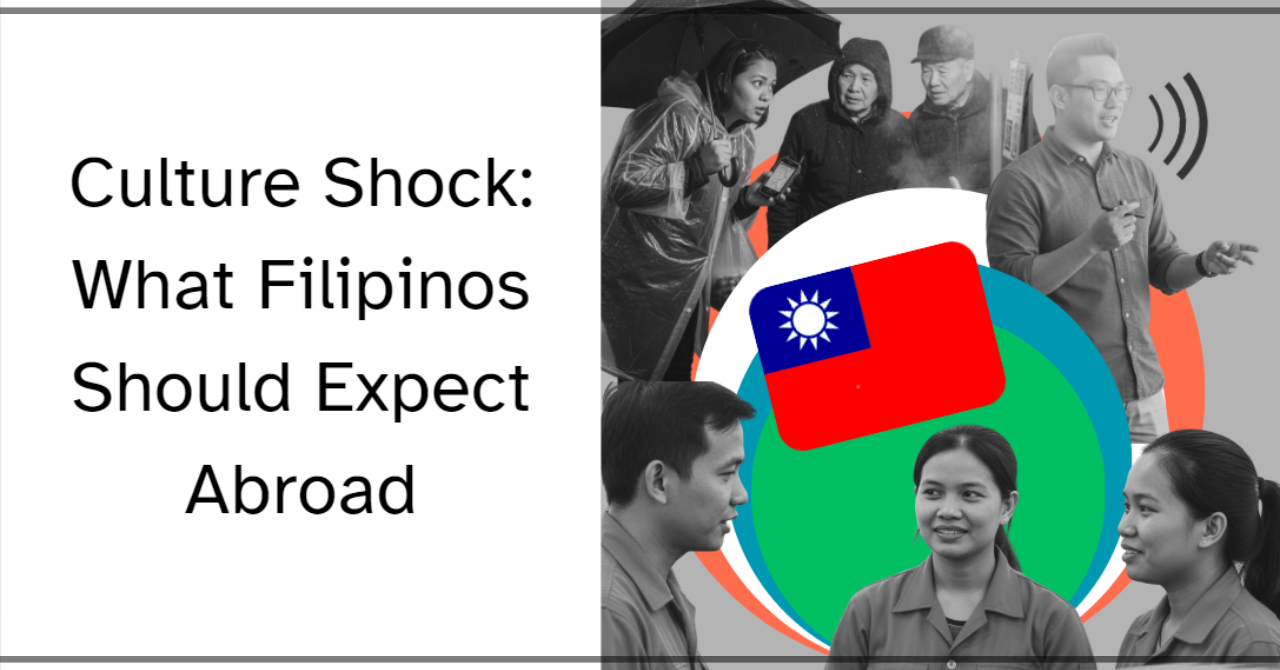When I first landed in Taiwan, I thought the hardest part would be the work itself. But what really tested me were the everyday moments — buying food, riding the train, or trying to connect with coworkers. These small but constant adjustments added up to what we often call culture shocks for Filipinos in Taiwan.
From language barriers to subtle social norms, from workplace dynamics to the pace of daily life, these shocks can feel overwhelming. But over time, I’ve realized that with patience, cultural openness, and support from fellow Filipinos, these challenges can turn into some of the most rewarding parts of living abroad.

Language Barrier
For most Filipinos, the language barrier is the first and biggest challenge in Taiwan. Mandarin Chinese is the official language, and Taiwanese Hokkien is also widely spoken. If you arrive without any background in Mandarin, even simple things — like ordering food or asking for directions — can feel intimidating.
I remember my first night at a convenience store, staring at food labels I couldn’t read. I ended up buying something spicy when I just wanted plain noodles. Experiences like this made me realize how crucial it is to learn at least basic Mandarin.
Thankfully, there are free or low-cost Mandarin classes for foreign workers. Learning simple phrases not only helps with daily life but also builds respect and connection with locals. Even if your pronunciation isn’t perfect, many Taiwanese appreciate the effort.
Social Norms and Communication
Taiwanese culture puts a strong emphasis on “saving face.” This means people avoid confrontation, public embarrassment, or direct criticism. As Filipinos, we’re used to being more vocal and expressive, so at first this indirect way of communicating can feel confusing.
In the workplace, for example, if your boss isn’t happy with your work, they might not tell you directly. Instead, they’ll hint at it or communicate through a supervisor. At first, I thought silence meant I was doing well, but later I learned it was a polite way of pointing out areas for improvement.
The key is to be observant and patient. Over time, you’ll learn to pick up on subtler signals, and you’ll also discover that private feedback is a sign of respect in Taiwan.
Work Culture and Opportunities
Another big adjustment is the work culture in Taiwan. Workplaces here tend to be more formal and hierarchical compared to what many of us are used to back home. Respect for seniority is important, and meetings often follow structured procedures.
At the same time, Taiwan offers plenty of opportunities for Filipinos, especially in factories, caregiving, healthcare, and education. I’ve seen fellow OFWs thrive as ESL teachers, bringing both skills and cultural exchange into the classroom.
For a closer look into this career path, check out An Inside Look into Working as a Filipino ESL Teacher in Taiwan, where we explore the daily experiences and challenges of teaching English here.
Tip: No matter what industry you’re in, punctuality and reliability are highly valued. Employers notice workers who consistently show professionalism.
Daily Life Adjustments
Beyond work, the pace of everyday life can also be a culture shock. Trains and buses run like clockwork, and people move quickly through public transport. Coming from a slower-paced environment, it took me a while to keep up.
Food habits are another adjustment. Taiwanese cuisine is rich in flavors and often very different from Filipino food. From hot pot dining to street snacks like stinky tofu, I had my fair share of surprises. Some habits — like not mixing rice with certain dishes or serving soup at unexpected times — really stood out.
For a deeper dive, see 10 Unspoken Food Habits in Taiwan That May Surprise OFWs.
Your first week in Taiwan will probably feel overwhelming — from navigating groceries to figuring out train routes. That’s why First Week in Taiwan: What OFWs Should Expect is a great guide to help you prepare.
Tip: Don’t be afraid to ask locals for help. Even if they don’t speak English fluently, many are kind and will go out of their way to assist.
Community and Support
The good news is that you’re never alone. The Filipino community in Taiwan is strong and supportive. From Sunday church gatherings to Filipino stores and restaurants, there are countless ways to feel at home.
Many OFWs join groups on Facebook or LINE where people share advice, job tips, and even directions to the nearest Jollibee. These communities are more than just social spaces — they’re lifelines when you feel homesick.
Taiwan also offers free Mandarin classes and has policies that support Southeast Asian immigrants. This makes it easier for Filipinos to integrate while still staying connected to our heritage.
If you want to see why many Filipinos choose Taiwan over other countries, check out 6 Reasons Why Taiwan Is a Top Destination for Filipinos.
Frequently Asked Questions
- What is the biggest culture shock for Filipinos in Taiwan?
The language barrier is usually the toughest, especially for first-timers who don’t know Mandarin. - How do Filipinos adjust to Taiwanese food?
It takes time, but most OFWs eventually enjoy local dishes while still seeking Filipino food in Little Manila areas. - Is the work culture very different from the Philippines?
Yes. Taiwan workplaces are more formal and hierarchical, but fair labor laws protect OFWs. - Are there Filipino communities in Taiwan?
Definitely. There are active Filipino groups, churches, and stores across major cities like Taipei, Taoyuan, and Kaohsiung.
Conclusion
Living in Taiwan comes with its fair share of culture shocks, but each challenge is also a learning opportunity. From the struggle of communicating in Mandarin to adjusting to workplace formality and new food habits, these differences can be overwhelming at first.
But as I’ve discovered, what begins as a shock often turns into something that enriches your experience abroad. With patience, cultural openness, and the support of fellow Filipinos, adapting to Taiwan becomes not just possible but rewarding.
